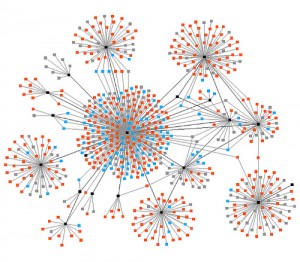 This Guest post is written by Cheryl Petersen, author of 21st Century Science and Health.
This Guest post is written by Cheryl Petersen, author of 21st Century Science and Health. She is a freelance writer and correspondent for The Delaware County Times. Cheryl’s website is Healing Science Today.com and she lives in upstate New York tweeting as @CherylPetersen
If you would like to write a guest post for this blog, check out the guidelines here.
A non-traditional worshipper is not alienated from traditional faith-based societies
The continued use of alternative faith-based social networks does not require me to estrange myself from traditional religion. Like many other committed adherents, I engage Christianity actively, but years ago I stopped attending a “traditional” religious organization.
 Instead, I’ve discovered church in alternative environments. Small home gatherings. Coffee shops. Everyday life. These unorthodox religious settings offer the advantages of autonomy and satisfaction. And, they come without the awkward dogmatic pressures and rituals which are prevalent in many conventional churches.
Instead, I’ve discovered church in alternative environments. Small home gatherings. Coffee shops. Everyday life. These unorthodox religious settings offer the advantages of autonomy and satisfaction. And, they come without the awkward dogmatic pressures and rituals which are prevalent in many conventional churches.
For 30 years I was a member of a Christian church. For almost 20 of those years I held positions and served at church religiously. When I altered my church habits, I was not a college student. I was not lost. I was not having a mid-life crisis. The shift to using nontraditional church more resembled the spirit of Abram when he said to Lot, “Let’s not have any quarreling between you and me, or between your herdsmen and mine, for we are brothers. Is not the whole land before you? Let’s part company” (Genesis 13:8, NIV).
For those of us who relate to God, we do take measures to participate in cultivating spiritual faith, power, and understanding. The obvious participants are observed at church facilities, temples, and synagogues. However, I’ve discovered a high number of participants who are not so conspicuous but yet are fine-tuning their faith through alternative networks.
Why the alternatives? Two reasons could be cited: followers know God is not confined to a physical location or institution. Or, followers have little interest in the conventional religious organization with a hierarchy that expects support from the bottom up but makes decisions from the top down.
Church can be seen as is a faith based social network that guides user’s behaviors and thoughts with particular views and methodologies in order to experience the Divine. An effective church creates convenient and advanced programs allowing people to perform sacred functions faithfully and more precisely.
We are not alone. There are millions of people who desire and expect a prompting, not to retrench defensively the preservation of valuable territory now controlled in faith, but to interact with a dynamic pragmatic understanding of God and Christ. We expect a scared experience. The Gospel Luke reads, “Now when Jesus returned, a crowd welcomed him, for they were all expecting him. Then a man named Jairus, a synagogue leader, came and fell at Jesus’ feet, pleading with him to come to his house because his only daughter, a girl of about twelve, was dying” (Luke 8:40-42, NIV).
To a degree we have already experienced the sacred. We are the over-dosed drug addict, the drunk lying on the floor in jail, or the severely injured person in intensive care, who, during those moments, felt the divine Holy Spirit, Christ, transform and heal our minds and bodies, bringing sacred meaning to life. T
These experiences not only wrenched from our minds a one-size-fits-all approach to Christianity, but it also prospected an expectation of unity. Paul told the Corinthians, “There are different kinds of working, but in all of them and in everyone it is the same God at work,” adding, “The eye cannot say to the hand, ‘I don’t need you!’ And the head cannot say to the feet, ‘I don’t need you!’” (I Cor. 12:6, 21, NIV)
 Although no longer a member of a religious organization, I do however occasionally visit services held at conventional institutions. Remarkably, I find some of the religious organizations are revamping and deconstructing their dictates to be more approachable and serviceable, even for newcomers. Instead of telling people how to think and act, both mini- and mega-churches are making an effort to go to the followers and get to know them.
Although no longer a member of a religious organization, I do however occasionally visit services held at conventional institutions. Remarkably, I find some of the religious organizations are revamping and deconstructing their dictates to be more approachable and serviceable, even for newcomers. Instead of telling people how to think and act, both mini- and mega-churches are making an effort to go to the followers and get to know them.
Paradoxically, this interactive attitude of discovering the strengths of other followers can be done right on the church premises. Many institutions have coffee shops on site or create environments conducive to dialogue.
Unfortunately, many of the user-friendly sites are not protected against pop-ups, and attention sometimes gets redirected from divine Love and Truth to ideological requirements, gender, social status, sexual orientation, hegemony and aspersions. The user base will appear to be weakened, however Christ continues powerfully to attract a network of spiritual progress that we can be a part of.




Awesome blog. I was out of traditional church for a solid ten years before returning. Our paths sound fairly similar and thankfully our God is the same, no matter where we attend, if any.
Blessed by your words and your openness. I’d love to submit a guest post some time if you’re open to that.
Thanks again!
Sure, submit something! Thanks for reading and connecting.